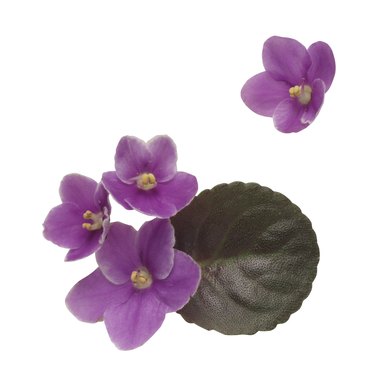
Saintpaulia, or "African violet" is not listed on any of the databases of poisonous plants and shows on informal listings as being non-poisonous. You can grow these flowers indoors and allow your dog free access to them without worry although it is better if the dog does not actually eat the plants.
Identification
Video of the Day
There are approximately 20 different varieties of African violets, and these range vastly in color and size. Miniature varieties are so small they can grow in a thimble. The leaves are round and dark green, with ruffled edges that curl under slightly and a velvety down on the top side of the leaves. If water lands on a leaf, it can cause the leaf to turn brown and die. The blooms may be single- or double-layered and come in purple, red, blue, orange, yellow, pink, white or variegated.
Video of the Day
Effects
Contact with African violets will not harm your dog. You may want to prevent your dog from ingesting the plants, however, as any unfamiliar material that is taken internally may cause an allergic reaction or diarrhea. Your dog should have no reason to eat an African violet although some dogs will eat anything they can reach. If your African violet has fertilizer or other additives in the soil, these are more likely to make your dog ill than the plant itself.
Symptoms
If your dog manages to eat an African violet or two, watch it closely for signs of vomiting or diarrhea. If it appears to have an upset stomach, withhold food for 24 hours to give its system time to expel the foreign matter safely. If the dog shows any signs of distress, such as excessive salivation, panting or lethargy, take it to the veterinarian immediately. Take a sample of the plant and the soil in which it was planted and, if possible, let the veterinarian know the name of any fertilizer or other soil additives you may have used.
Treatment
Your veterinarian will most likely induce vomiting if he believes the dog has ingested something poisonous along with the African violet. For diarrhea, he may give medication to help protect the stomach against the foreign matter, but for poisonous substances he will give the dog activated charcoal to swallow.